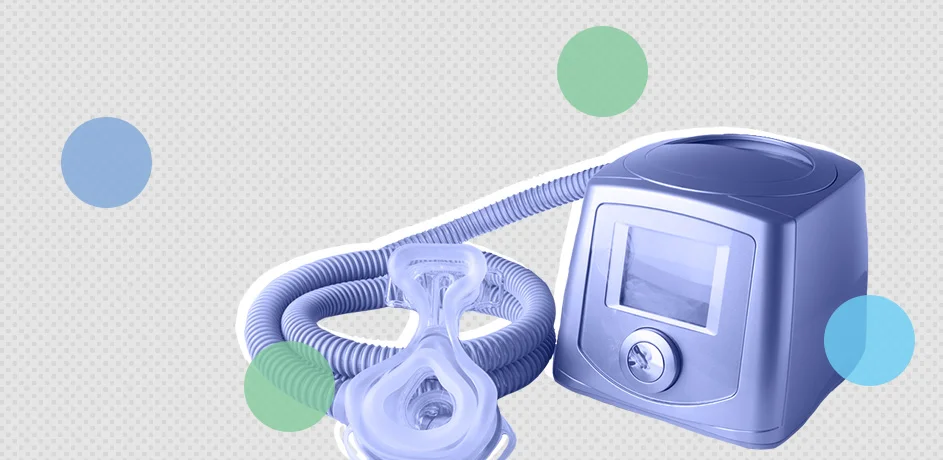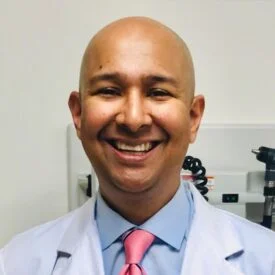
Nothing beats that feeling of relaxation you get when you settle into a cozy bed each evening, letting the stress of your day melt away as you drift off to dreamland. Tomorrow, you’ll wake up refreshed, rejuvenated, and ready to face the next day — that is, unless you spend the whole night roaring and snoring away.
An estimated 45 percent of adults snore occasionally, while up to 25 percent snore on a regular basis, according to Johns Hopkins Medicine1, but snoring may be more than an unappealing nuisance that drives your bed partner bonkers. Sometimes regular snoring indicates the presence of a sleep disorder, which may take a toll on your health if left undiagnosed and untreated.
There are many ways to reduce the health risks of snoring and sleep disorders, including CPAP therapy. That’s why we checked in with our Chief Medical Advisor Dr. Raj Dasgupta, MD, FACP, FCCP, FAASM, to find out what CPAP machines do, how they work, when they’re needed, and much, much more.
What Is CPAP and What Does It Do?
A CPAP (Continuous Positive Airway Pressure) machine is a medical device used to treat OSA or obstructive sleep apnea2, which is “a sleep disorder characterized by repeated episodes of complete or partial collapse of the upper airway.”
Put simply, people suffering from OSA literally stop breathing for short periods of time multiple times a night, which results in them getting less oxygen while they sleep and leads to loud, often arrhythmic snoring and increased daytime sleepiness.
There are various types of CPAP machines available today, but most involve a mask or nasal pillow that goes over your nose and/or mouth to deliver a constant stream of pressurized air and essentially help you breathe during sleep by helping keep the airway open.
Understanding the Difference Between Snoring and Sleep Apnea
Many people wrongfully assume that regular snoring means you must have sleep apnea and, therefore, you should have a CPAP. This isn’t the case because regular run-of-the-mill snoring and sleep apnea are two totally different things that happen for two totally different reasons.
Snoring happens when the soft tissues in your throat, including the soft palate, uvula, and tongue, partially block the upper airway and vibrate as you breathe. This can be influenced by many things, including sleep position, nasal congestion, drinking alcohol, obesity, or even just your personal anatomy.
Sleep apnea, on the other hand, involves repeated interruptions in breathing — as in you literally stop breathing multiple times a night, for seconds at a time or longer. Because of this, people suffering from sleep apnea often wake up choking or gasping for air, ultimately leading to a decrease in their sleep quality and overall quality of life.
Just because someone snores doesn’t mean they’re suffering from some undiagnosed type of sleep apnea. However, according to the Journal of Clinical Sleep Medicine3, approximately 94 percent of OSA patients snored regularly, meaning you may consider consulting a sleep specialist and completing a sleep study if you’re snoring every night.
When Snoring Might Require a CPAP Machine
Are you a boring old regular snorer or are you secretly suffering from undiagnosed obstructive sleep apnea?
“Snoring by itself doesn’t always mean sleep apnea,” Dr. Dasgupta says, “but when it’s paired with mouth breathing, disrupted sleep, or symptoms like fatigue, this is a red flag. Many people don’t even realize they have OSA until they do a sleep study, which is why I always stress the importance of getting evaluated by a doctor.”
If you snore regularly, frequently experience headaches in the morning, or exhibit any of the other symptoms described above, it may be time to undergo a comprehensive sleep evaluation, either through an in-lab polysomnography or an at-home sleep test. A formal diagnosis from a qualified medical professional is essential in determining if the use of a CPAP device is right for you.
Alternatives to CPAP for Snorers Without Sleep Apnea
CPAP therapy is one of the best treatment options to remedy the symptoms of sleep apnea, but just because you snore doesn’t mean sleep apnea treatment is medically necessary. There are many alternatives to CPAP for snorers who do not have sleep apnea.
According to the Permanente Journal4, “Treatment for snoring may include weight loss, avoidance of supine sleeping position, sleeping with head elevated, avoidance of alcohol or sedatives at night, and treatment of nasal symptoms.”
Anti-snoring devices like mouthguards, nasal strips, and specially designed pillows may help keep airways open and help you stop snoring.
And don’t underestimate the impact that good sleep hygiene may have on your overall sleep health. Keep a consistent bedtime, develop a pre-bedtime ritual that encourages relaxation, and avoid the use of sleep medicine, especially sedatives, which may actually exacerbate or induce snoring5 in many cases.
Risks of Using CPAP Without a Diagnosis
You’re a do-it-yourselfer that doesn’t want to waste time waiting for a sleep study to get started, so you’re thinking about buying your own CPAP machine out of pocket and starting ASAP with your CPAP. Don’t.
Using a CPAP machine without a diagnosis and the oversight of a healthcare provider may not be effective and, in some cases, may be detrimental to your health rather than beneficial. Here are a few risk factors associated with using a CPAP machine without a diagnosis:
- Expense: CPAP machines are expensive, and costs quickly add up over time since you’ll want to replace the filters, hoses, and the CPAP mask every so often. Insurance may completely cover these costs if you get a diagnosis and prescription.
- Inconvenience: Not only will insurance foot the bill if you have a prescription, they’ll often connect you with a supplier who will send new CPAP supplies straight to your door every few months.
- Incorrect use: Your sleep specialist often won’t just write a prescription and send you out the door. They’ll also provide guidance on how to use the machine properly and adjust the machine’s air pressure settings, so you can clear blockages and improve airflow with minimal discomfort and risk of injury.
- Misdiagnosis: CPAP therapy is not a panacea for snoring and other sleep disorders, so strapping on a full-face mask like you’re Darth Vader and expecting all your problems to be solved instantaneously may be inappropriate, ineffective, and incorrect.
“Sleep apnea is a medical condition that needs to be properly evaluated,” says Dr. Dasgupta. “Trying to self-diagnose and manage it without a professional can be risky. For example, if someone actually has central sleep apnea or another underlying issue, CPAP might not be the right treatment at all.”
When to See a Doctor About Snoring
Does your snoring sound more like roaring? Do you often wake up in a haze feeling fatigued and mentally foggy? Are you drowsy throughout the day or find yourself drifting off to sleep on the couch, at your desk, or even behind the wheel?
If you answered yes, it may be time to see your doctor about your snoring. According to a study in Medicina6, side effects of untreated obstructive sleep apnea include “obesity, cardiovascular complications, poor work performance, occupational hazards, and increased motor vehicle accident risks.”
The benefits of early diagnosis are huge: better sleep, improved focus, and even lowered risks of heart disease and stroke. It’s always better to get clarity than to guess.
Final Thoughts: Is CPAP the Right Solution for You?
Most people aren’t thrilled to undergo CPAP therapy, but it’s one of the most effective treatment options for those suffering from sleep apnea. Proper use of a CPAP machine offers many health benefits, from better sleep and improved energy during the day to reduced risk of cardiovascular issues and other health complications.
“CPAP therapy can take some getting used to, but I’ve seen firsthand how life-changing it can be,” says Dr. Dasgupta. “People go from waking up exhausted every morning to feeling truly rested, sometimes for the first time in years.”
Just because CPAP therapy is often beneficial, though, does not mean it would be beneficial for you. Only a doctor or other qualified medical professional can determine if using a CPAP machine is right for you and your symptoms.
So, don’t snooze on getting yourself the right care. See your doctor ASAP and find out if using a CPAP machine will help you stop snoring today.
FAQs
Can I buy a CPAP without a prescription?
The FDA considers a CPAP machine a Class II medical device that requires a prescription to purchase. This ensures CPAP machines are used properly to treat diagnosed sleep apnea.
Is snoring always a sign of sleep apnea?
Patients with OSA and other types of sleep apnea are almost always snorers, but that doesn’t mean regular snorers must have sleep apnea. Snoring that is not caused by sleep apnea should not require the use of a CPAP to remedy.
What are the first steps if I’m concerned about my snoring?
A good step one for most medical conditions is to schedule an appointment with your doctor or other qualified healthcare provider. The process for diagnosing and treating your snoring often includes that initial appointment and a sleep study, which means it may take time before you begin to receive proper treatment. That’s why it’s so crucial to get the ball rolling now.
What’s the best treatment for snoring that’s not sleep apnea?
CPAP therapy is very effective for sleep apnea, but may be inappropriate if your snoring is not related to sleep apnea. For regular snorers, implementing lifestyle changes, abstaining from alcohol, sleeping on your side, or using oral appliances like mouthguards may provide relief.
However, over-the-counter treatment is never better than seeing your doctor and receiving a formal diagnosis and treatment options, so be sure to set that up ASAP to get the treatment you need for better sleep today.
References
1. Why Do People Snore? Answers for Better Health. Johns Hopkins Medicine. August 8, 2021. Accessed July 17, 2025.
2. Slowik JM, Sankari A, Collen JF. Obstructive Sleep Apnea. [Updated 2025 Mar 4]. In: StatPearls [Internet]. Treasure Island (FL): StatPearls Publishing; 2025 Jan
3. Alshaer H, Hummel R, Mendelson M, Marshal T, Bradley TD. Objective Relationship Between Sleep Apnea and Frequency of Snoring Assessed by Machine Learning. J Clin Sleep Med. 2019;15(3):463-470. Published 2019 Mar 15. doi:10.5664/jcsm.7676
4. Bernstein P, Ebba JH. Snoring versus obstructive sleep apnea: a case report. Perm J. 2006;10(1):21-23. doi:10.7812/TPP/05-116
5. McEntire DM, Kirkpatrick DR, Kerfeld MJ, et al. Effect of sedative-hypnotics, anesthetics and analgesics on sleep architecture in obstructive sleep apnea. Expert Rev Clin Pharmacol. 2014;7(6):787-806. doi:10.1586/17512433.2014.966815
6. Surani S, Taweesedt P. Obstructive Sleep Apnea: New Perspective. Medicina (Kaunas). 2022;59(1):75. Published 2022 Dec 29. doi:10.3390/medicina59010075



























